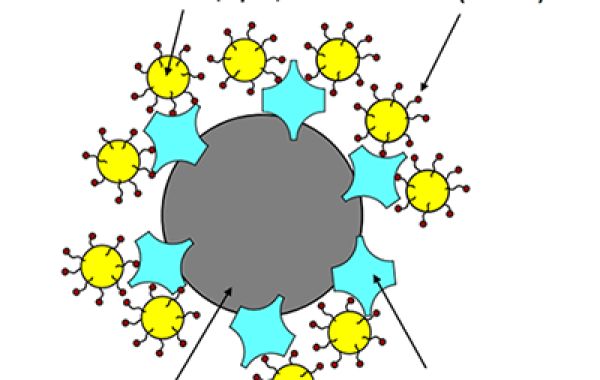With years of experience in the pharmaceutical and life science sectors, CD Bioparticles has announced a range of new Conjugated Polystyrene Particles in various sizes for biological or chemical assays. The new particles are available with a variety of biomolecules, including Avidin, Biotin, Antibodies and Protein A.
There are several strategies for attaching biological ligands to polystyrene particles. The original method for binding proteins to hydrophobic microspheres is passive adsorption. This method is still widely used today because of its simplicity and flexibility. This physical protein adsorption is governed by van der Waals forces, hydrophobic interactions, electrostatic interactions, and hydrogen bonding between the hydrophobic portion of the adsorbed ligands and the polymer surface of the polystyrene particles.
Covalent attachment strategies are more specific than physical adsorption and involve chemical reactions between different residues of interacting molecules (e.g., amines, carboxyl groups, aldehyde sulfates). Covalent coupling is often employed to immobilize biomolecules when highly active and stable microsphere reagents are required. The conditions for covalent bioconjugation between biomolecules and microspheres must be consistent, predictable and stable to achieve high quality polystyrene particle-antibody interactions. Solvent conditions such as buffer type, pH, and ion concentration play a critical role in achieving optimal antibody-directed binding.
Protein pre-coated ligands (affinity binding ligands) exploit specific binding interactions between molecules and help to rapidly develop or simplify the production of microsphere reagents. They provide opportunities for optimal ligand orientation, such as the immobilization of biotinylated oligonucleotide termini on streptavidin-coated microspheres or the Fc-specific immobilization of antibodies via Protein A or G.
CD Bioparticles now offers a wide variety of Polystyrene Particles conjugated with Avidin, Biotin, antibodies, and Protein A for the convenience of researchers. CD Bioparticles scientists can also customize strategies for attaching biological ligands to polystyrene particles for use in immunological tests and assays, cell sorting, biosensing, immunoassays (e.g., agglutination assays, ELISA, particle capture and contrast reagents), and lateral flow assays.
For example, CD Bioparticles provides Polystyrene Particles with Avidin on the surface for easy binding of biotinylated molecules. The DiagPoly™ Avidin Polystyrene Nanoparticles, 100 nm (Cat. No. DNG-P068) are supplied in PBS buffer (pH=7.4) with 0.02% sodium azide, polydispersity index 0.2, suitable for binding biotinylated molecules easily with a high affinity.
Polystyrene Particles with Heparin on the surface are also available at CD Bioparticles and are widely used for affinity purification of various heparin-binding proteins or ligands, such as antithrombin III, lipoprotein, and DNA-binding proteins (e.g., transcription factors, and viral envelope proteins).
CD Bioparticles has developed a wide range of polystyrene micro- and nanoparticles. For more information, please visit https://www.cd-bioparticles.com/products/conjugated-polystyrene-particles-322.html.
About CD Bioparticles
CD Bioparticles is a leading manufacturer and supplier of various nanoparticles, microparticles, and coatings for RD as well as commercialization across different application areas, including in vitro diagnostics, biochemistry, cellular analysis, cell separation, and immunoassay. The company also offers various custom services, including chemical surface-functionalization, fluorescent modification, antibody immobilization, as well as nucleic acid and oligo conjugation to meet client specifications.








